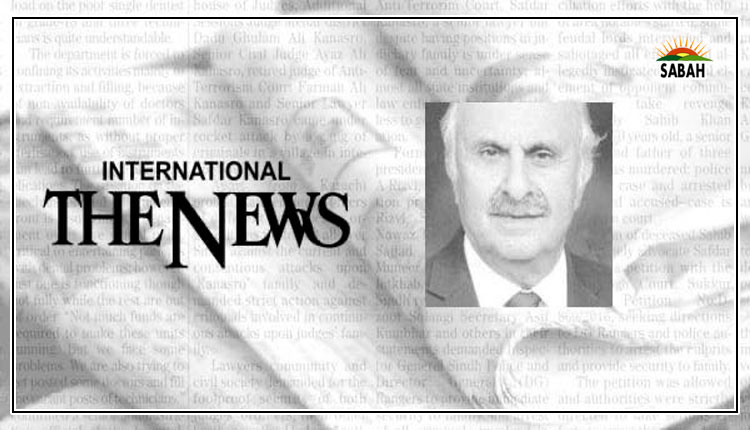Judicial reforms needed ۔۔۔۔Lt-Gen (r) Abdul Qayyum
The early demise of Quaid-e-Azam and the unfortunate assassination of Liaquat Ali Khan delayed the formulation of Pakistan’s constitution, delivering the first severe blow to the newly formed state.
In the absence of a constitution and credible elected political leadership, the bureaucracy wielded significant power. This serious vacuum in statecraft drew ambitious military commanders into the corridors of power, where they held influence, overtly or covertly.
Prolonged military rule was occasionally interrupted by democratic governments, which rarely had the chance to complete their constitutional terms in office. Consequently, two other crucial pillars of the state – parliament and judiciary – were severely weakened. Furthermore, the lack of continuity in policy proved disastrous, hindering sustained economic growth and delaying long-term electoral and judicial reforms.
The last devastating blow to the system occurred in 2017 with the orchestrated ouster of the sitting prime minister. Ironically, it happened at a time when all assessments indicated that Nawaz Sharif was poised to secure another term due to his track record of sustained economic growth, the signing of the CPEC contract, development of an international-standard communication network – including the Gwadar Port, airports, and motorways – resolution of the acute energy crisis, and, notably, the successful counterterrorism policy implemented through the National Action Plan. His abrupt removal undoubtedly dealt a crushing blow to the political, economic, and social framework of the state, which is still reeling from the aftershocks.
Pakistan’s misfortune continued as the establishment-backed successor to the PML-N government, despite his international cricket fame, failed to transition from celebrity status and, even with counsel from mentors, struggled with the complexities of political diplomacy and governance. Despite the ‘RTS magic’, the PTI government couldn’t secure a simple majority and had to rely on allies to form a minority government, which collapsed when allies withdrew their support. The premature ouster of the PTI government proved to be politically unwise, as it generated a wave of sympathy for the ousted leader.
The opposition, however, believed that the immediate ouster of the PTI government through constitutional means was necessary to avert an imminent national default, even at a high political cost. Although the default was averted, the PDM parties suffered significant political damage, which became evident in the general elections held on February 8, when the PTI emerged as the single largest party – though not large enough to form a government independently. This outcome further complicated the situation, as no party could secure a simple majority. Moreover, serious allegations of rigging in some constituencies are now being investigated through legal channels.
As a result, Pakistan currently faces intense political polarization and gridlock, with the opposition focused on undermining and blaming key institutions like the Election Commission, judiciary, and military to render them controversial. Although other state institutions remain intact, visible cracks have appeared within the judiciary. This pressing situation necessitates urgent legal and electoral reforms, with essential constitutional amendments currently under consideration.
First, there is an urgent need to establish a federal constitutional court to improve the current judicial system, which has 2.4 million cases pending in various courts, including 60,000 in the Supreme Court alone, where an additional 25,000 cases are filed annually. This backlog is a key reason why the World Justice Project’s Rule of Law Index 2023 ranks Pakistan 130th out of 142 countries, with only Sudan, Somalia, and Syria behind us. Furthermore, due to poor accountability and a fragile rule of law, the Global Corruption Perception Index (CPI) 2023 places Pakistan at 133rd out of 180 countries.
Second, promotions within the judiciary should be based purely on merit, similar to the military, where every officer is evaluated on their performance at their current rank before being promoted. If an individual’s performance is subpar, they should not be promoted solely based on seniority. In the United States, the president appoints the chief justice of the Supreme Court, subject to Senate confirmation.
Parliament, composed of elected representatives, plays a crucial role in protecting public interests. While the trichotomy of power is essential, parliament members are accountable to the people, the government to Parliament through oversight, and judges to the government to clear the backlog of cases while avoiding collusion with political parties or the establishment.
Third, the proposed amendment regarding the tenure of the chief justice of the Supreme Court is valid to ensure meaningful contributions and the implementation of legal reforms. In the current system, a judge promoted based on seniority may retire in a month and enjoy the privileges of a retired chief justice for life. Conversely, a younger chief justice may remain in office for ten years, blocking promotion opportunities for other talented justices.
Lastly, the constitution serves as a social contract to ensure the welfare of the people. If justice is denied through delayed litigation, unnecessary judicial activism, and politicization, parliament has the authority and responsibility to provide legal cover to the sitting government to rectify this imbalance.
Currently, all three categories of cases – civil, criminal, and constitutional – are directed to the Supreme Court, which has only seventeen judges. This creates significant difficulties for litigants that must be addressed not only by establishing a constitutional federal court, which is functional in 77 countries, including Germany, France, and South Africa but also by increasing the number of judges in the Supreme Court and fixing the tenure of the chief justice based solely on merit.
The writer is former chairman
Senate Standing Committee on
Defence Production.
Courtesy The News












